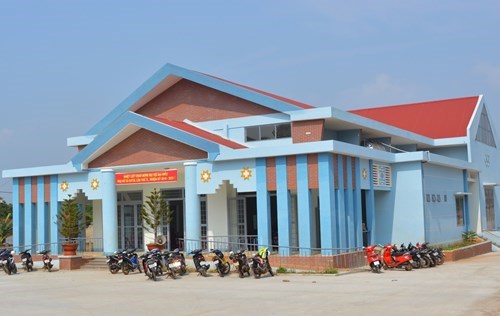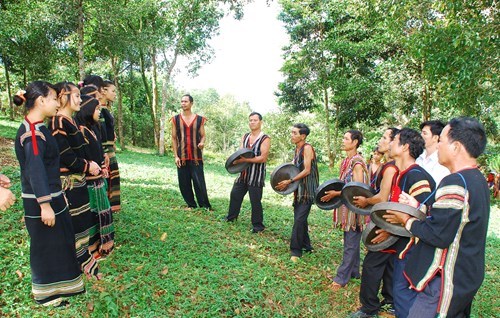Miracle in Ea Tul
Ea Tul commune, Cu M’gar district, Dak Lak province, is harvesting coffee. The even tarmac road to the center of the commune makes everyone feel that the distance is shorter. New houses, schools, and medical stations are interconnected by a system of concrete roads.
The infrastructure and living standards of local people have been improved significantly thanks to investment from higher levels via assistance programs and policies, facilitated by the Party’s resolutions and the Governments’ socio-economic development programs, said Le Cong Bat, Deputy Secretary of the commune's Party Committee.
Last year, the commune met the demands of new-style rural areas and the average per capita income was VND 35 million.
    |
 |
|
A communal hall in Cu M’gar district, Dak Lak province |
In the past, it was hard to travel due to lack of good roads. Meanwhile, the schools were too far for the children to go to and patients could not go to hospital due to the long distance and poor means of transportation, recalled village patriarch Y Riu A Drong of Ea Tul’s Knie village.
“Now the schools and medical stations are close and transportation is convenient, so everyone is very delighted. That development is a miracle,” he added.
According to a report of the Central Highlands Steering Committee, the region recorded remarkable achievements in 2017. The region’s total production value was estimated at VND 165,472 billion (an increase of 8.09%) and GDP per capita was nearly VND 41.6 million, an increase of 5.02%.
Together with the Central Highlands, last year, the Northwestern and Southwestern regions also gained impressive achievements in socio-economic development. The living standards of the local people have been gradually improved; national defense and security was ensured; national sovereignty was firmly protected; external affairs were boosted; the political system was consolidated; and ethnic and religious affairs were effectively implemented.
Preservation and promotion of traditional cultural identities
The Party and State of Vietnam plan to develop a common but diversified culture among ethnic groups, preserving and enhancing traditional cultural identities of ethnic groups. Therefore, cultural activities of ethnic minorities are a combination of traditional and modern cultures in the trend of exchange, integration, and development.
    |
 |
|
The Gongs cultural space in the Central Highlands |
Cultural life of the ethnic groups has also improved significantly. Many tangible and intangible cultural values of the ethnic minorities have been preserved and facilitated to develop such as the Gongs cultural space in the Central Highlands, My Son Sanctuary, and Dong Van Stone Plateau.
Meanwhile, in Southwestern provinces, the Festive Day of Culture, Sports, and Tourism of the Khmer people is organized once every three years and rotationally hosted by different provinces in the region. This is an important cultural event to realize the plans and guidelines of the Party and State to develop economic, cultural, and social life of ethnic groups nationwide. This also proves special traditional cultural values of the Khmer people and helps lure more tourists to the area.
The preservation of spoken and written languages of ethnic minorities is prioritized in Vietnam’s educational policies. The Government of Vietnam issued Decree 82/2010/ND-CP to regulate the education of spoken and written languages of ethnic minorities at public schools and centers for continuing education. The Ministry of Education and Training is in concert with UNICEF to implement a pilot bilingual education program on the basis of mother-tongue in three provinces of Lao Cai, Tra Vinh, and Gia Lai with good initial results.
It is obvious that the achievements gained in improving material and spiritual life of ethnic groups proves the correct plans and guidelines of the Party and State, and the ethnic groups’ solidarity in building the country.
Those are also vivid examples to realize Article 5 of Constitution 2013, which reads “The Socialist Republic of Vietnam is the united nation of all nationalities living on the territory of Vietnam. All nationalities are equal, united and mutually respect and assist one another in their development; all acts of national discrimination and division are strictly forbidden. The national language is Vietnamese and every nationality has the right to use its own language and system of writing, to preserve its national identity, and to promote its fine customs, habits, traditions and culture. The State implements a policy of comprehensive development, and provides conditions for the national minorities to promote their internal abilities and to develop together with the nation.”
Translated by Nam Long